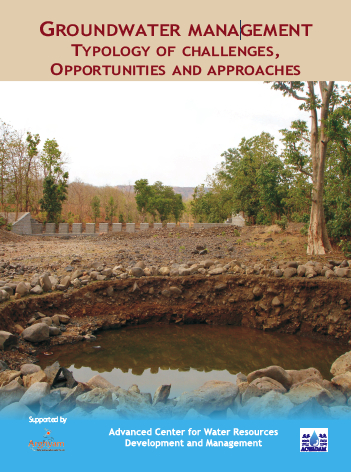Groundwater Recharge
200 ft deep well needed for rain water storage so that it is used to recharge underground water pockets
Posted on 31 Mar, 2010 03:12 PMUse of rain water to recharge quickly the deep under ground water pockets
Present problem:
- Due to urbanization, many a under ground water recharge/enrichment points have be closed/covered/blocked. So, % of water reaching the underground water pockets is reduced to a very great extent.
- Bore wells are dug at a very large number to satisfy the increasing demand for water. Therefore, level of underground water table is going down alarmingly.
- As many the opportunities for the rain water to reach the underground level is blocked almost at all places, even with a little bit of rain, the water will run on the roads & cause artificial flood or water blocking at different points on roads or low laying areas of the Cities. Such floods are causing a lot of traffic jams/road mishaps.Rain water on the road is also damaging the durability of the TAR roads.
Using dried wells to enrich deep level under ground water pockets
Posted on 31 Mar, 2010 02:45 PMBy using dried open wells, we can enrich the Underground water quickly.
In the good old days, open wells used to help the common man in fetching water for all purposes and specially the drinking water. Invasion of pump-sets and specially the deep bore wells have pulled the underground water indiscriminately. Therefore, the water table level of the underground water is continuously going down at a very alarming rate. This fall in the underground water table level has made many a very big and useful water wells dry up. Now they are not in use as people do depend on alternative source of water like bore well water or the tap water drawn from far off river water.
200 ft deep wells , in the corner of roads/parks , needed for rain water harvesting in cities
Posted on 31 Mar, 2010 11:51 AMRAIN WATER HARVESTING AT CITY.
LET US MAKE PLANS TO PRESERVE WATER AND SAVE THE ROADS.
Water is an important and essential commodity to every one which is to be preserved.
AT CITIES.
An innovative way of sharing diminishing groundwater introduced by APDAI
Posted on 27 Mar, 2010 12:55 PM“We no longer worry about the rains. We now have the confidence to grow alternative crops even if the monsoon fails,” said Balaraju, a farmer in one of the most drought-prone and economically vulnerable regions of Andhra Pradesh in southern India.
Dug well recharge scheme (2007-08 to 2009-10) - Revised guidelines with amendments to the scheme by the Central Ground Water Board
Posted on 24 Mar, 2010 03:46 AMThe State sector scheme on artificial recharge to groundwater through dug-wells is under implementation over the first three years of the (current) XI Plan Period (2007-12), in 1180 over-exploited, critical and semi-critical blocks/ talukas/ mandals in seven states of the hard-rock peninsular region of India, namely Andhra Pradesh, Maharashtra, Karnataka, Rajasthan, Tamil Nadu, Gujarat and Madhya Pradesh. The target beneficiary of the scheme are farmers who have privately owned wells, in their agricultural land.
Groundwater Management - Typology of challenges, approaches and opportunities - Research papers from the conference organised by ACWADAM and Arghyam at Pune (May 2009)
Posted on 17 Mar, 2010 04:40 AM A workshop on groundwater was organised by ACWADAM and Arghyam Trust in Pune in May 2009, that brought together several experts in the field, and explored diverse topics such as the importance of scale in groundwater resource planning and management, importance of aquifer typologies, participatory processes of groundwater management, groundwater regulation and groundwater linkages with watershed development, markets and policy matters.
A workshop on groundwater was organised by ACWADAM and Arghyam Trust in Pune in May 2009, that brought together several experts in the field, and explored diverse topics such as the importance of scale in groundwater resource planning and management, importance of aquifer typologies, participatory processes of groundwater management, groundwater regulation and groundwater linkages with watershed development, markets and policy matters.
The attempt of the workshop and research papers presented, was to highlight contemporary issues in groundwater management, and to look at it through the multiple lenses of hydrogeology, sociology, economics, livelihoods, environment, disasters and so on.
Hydrogeological studies for improved groundwater management strategies in the dryland areas underlain by Deccan basalts - ACWADAM
Posted on 02 Mar, 2010 05:18 PMImproving water quality through recharge of open wells - VP Thuruth - Trissur - Kerala - The Mazhapolima intervention programme
Posted on 27 Dec, 2009 07:47 PMMazhapolima was a participatory well recharge programme initiated by the Thrissur district, under which domestic water sources were recharged with rainwater harvested (usually) from roof tops.
Recommendations of the Working Group meeting on technological issues related to groundwater - Day 2
Posted on 26 Nov, 2009 03:32 AMAttending today's technology sessions, I couldn't help thinking about what Carl Sagan once remarked about science and technology. He noted,
Isotope fingerprinting of Ganga Basin groundwater : A presentation by Prof P.S.Dutta of IARI
Posted on 25 Nov, 2009 05:43 AMOne of the most grippping and intensly scientific presentation at WHSC has been this one, by Prof. P.S. Datta of the Nuclear Research Laboratory, IARI. Groundwater can be studied in its entirety by profiling the isotopes of water.





